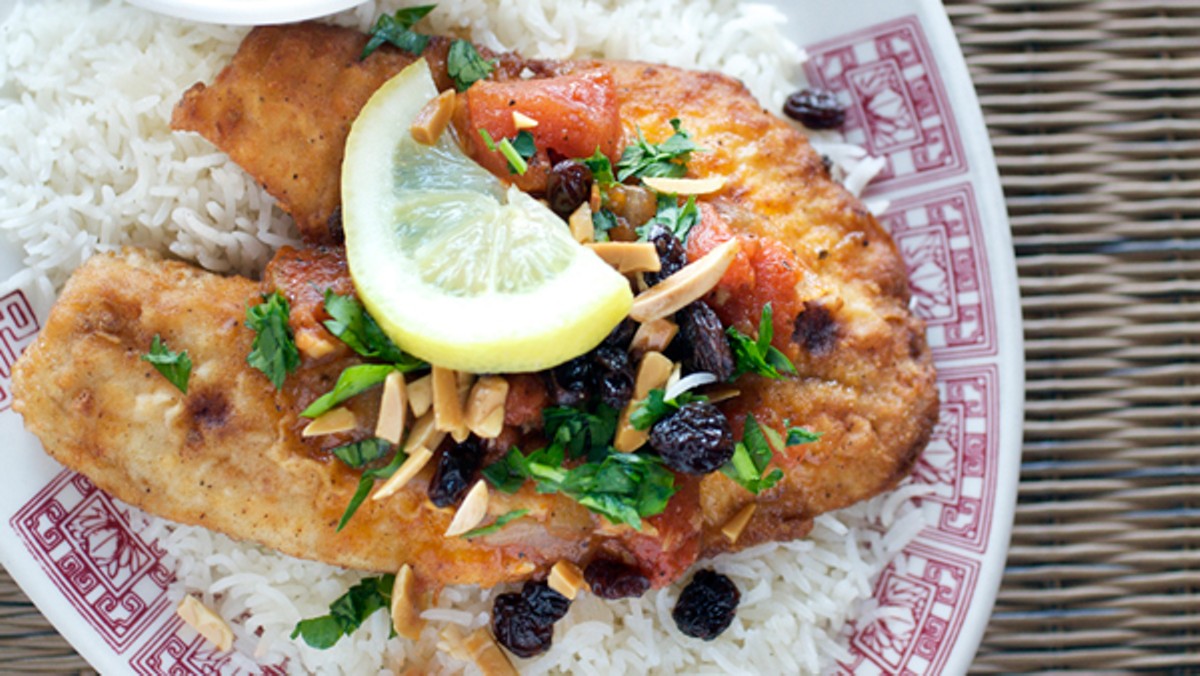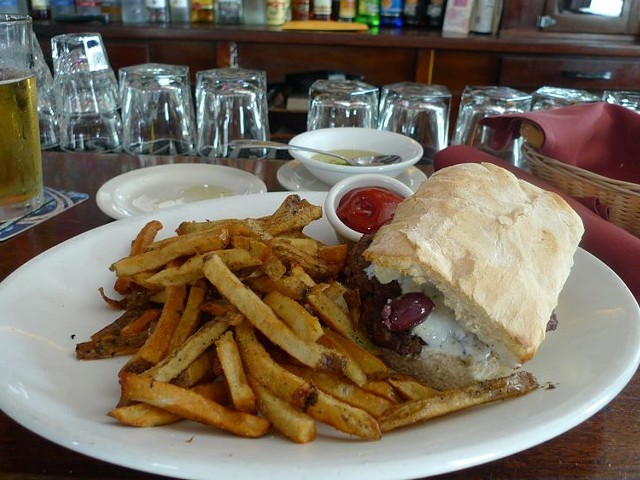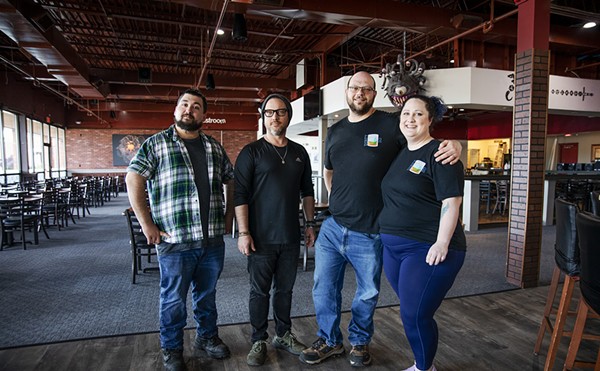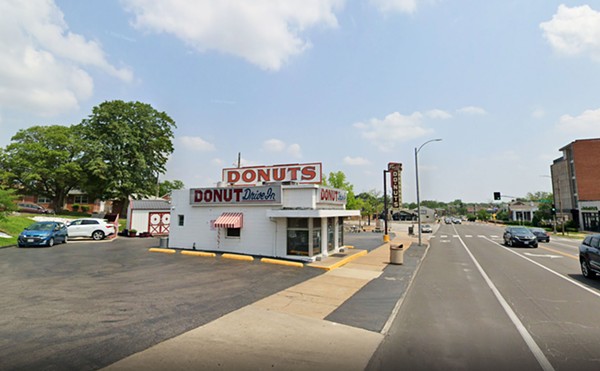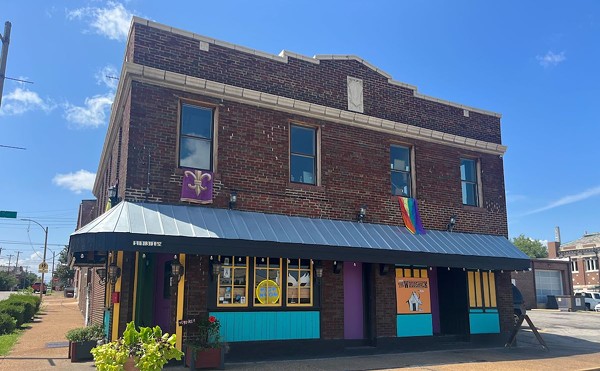The "Al Waha Plate" at Al Waha Restaurant & Hookah Lounge is unlike anything I've ever eaten. It doesn't look that unusual — at least, not at first — ground beef in a red sauce spooned over and around a mound of rice. Atop the dish are slivered almonds and what appears to be parsley. If you didn't know any better, you might think it was some impoverished student's whatever's-in-the-fridge approximation of spaghetti bolognese.
Except the "parsley" is actually mint, the sauce is made with pomegranates and chiles as well as tomatoes, and raisins and dried apricots are strewn throughout.
Al Waha's menu lists each dish's ingredients, so I knew, in general, what I was getting. Pomegranate stood out, but I'd eaten savory dishes flavored with the fruit before: lamb, seafood. Yet the combination of pomegranate and ground beef is, well, different somehow. Precisely how is difficult to describe; the contrast between the savoriness of the beef and the tartness of the pomegranate ain't easy to get one's palate around.
With each bite I felt I was getting closer to understanding how this dish is supposed to work. The pomegranate keeps it from becoming too heavy; the beef keeps it from being too light. The dried fruit adds a textural contrast, the mint a touch of brightness. (Chiles' heat might have added even more complexity, but these chiles were tame.) Still, the best description of the "Al Waha Plate" might be my first: It is unlike anything I have ever eaten.
That statement is inevitable at Al Waha. This is the first Bedouin restaurant in St. Louis. It claims to be the first Bedouin restaurant anywhere in the Midwest, which I'm inclined to believe, some (by no means exhaustive) Internet sleuthing having turned up only one other Bedouin restaurant in the entire United States, a place in Brooklyn, New York, that specializes (it seems) in pizzas made on pita bread.
Cue the inevitable joke about Bedouin restaurants being hard to locate because they are always on the move. In fact, the Bedouin are now largely settled throughout the Middle East. Al Waha claimed its spot in South Grand Boulevard's stunningly diverse restaurant scene in March, in the space formerly occupied by the Afghan restaurant Sameem. (Fans of Sameem should know that it continues to exist as Kabob Palace on Manchester Road in Manchester, just west of the interchange with Highway 141.)
Riyad Al Wadi formerly ran nearby Petra Café & Hookah Lounge, which he sold last year. As Al Waha's full name suggests, it too offers hookahs, and a separate section for smoking is available throughout the day. The overall feel of the dining room is bright and airy. The décor includes a large, wall-mounted sculpture of two hookahs and a painting of an old man smoking a hookah. Should this put you in the mood to smoke, the water pipes are available at the tables outside the restaurant at any time of day, weather permitting. [Editor’s note: A correction ran concerning this paragraph; please see end of article.]
Your meal will begin with a small, complimentary cup of Bedouin coffee, a gesture of the hospitality for which the Bedouin are famous. This coffee is very strongly flavored with cardamom, a burst of spice that, if nothing else, will prep your palate for the meal to come.
From here your experience can develop in one of several different directions. There are Bedouin dishes, of course, none more remarkable than the "Al Waha Plate." On another visit I opted for pil pil, subtitled "The Prince's Dish" (and not to be confused with the Basque preparation of the same transliteration). Pil pil brings shrimp in a tomato sauce seasoned with garlic, onion, chiles and mint, served over basmati rice. The shrimp were properly cooked and reasonably plump, the sauce flavorful, the sweet acidity of tomato rounded out by the other ingredients, with a very mild heat.
Other dishes tap into the larger context of the Middle East and will be familiar to many diners: kabobs, chicken shawarma. Of course, there is hummus, medium thick, sprinkled with tart sumac and served with a generous splash of olive oil. Eggplant makes multiple appearances: fried and then topped with pomegranate sauce or blended with garlic and tahini (motabel). Musakaah is a very tart — possibly too tart, for some — dip of chopped eggplant, garlic, onion, tomato and whole chickpeas, topped with a dollop of homemade yogurt. (Yes, that sounds like moussaka — that's because the names of both eggplant dishes share a common Arabic root.)
In addition, Al Waha has retained several Afghan dishes. Qabelli palau is basmati rice cooked in lamb stock and served with a hunk of braised lamb shank, raisins, carrots and slivered almonds. The lamb shank was tender and richly flavored, but little of that flavor seemed to have made its way to the rest of the dish. The basmati rice tasted like basmati rice, nothing more or less.
Makni chicken — or butter chicken, as it is sometimes called — fared better. The dish is much like a mild north Indian curry: chopped chicken in a tomato sauce thickened with butter and cream and lightly spiked with chiles and a mélange of spices. This dish is so much like a curry, in fact, that you might find yourself looking in vain for a piece of naan bread. (You can order a side of pita, though the pita served with the hummus and musakaah was dry and bland.)
I do understand the presence of the Afghan dishes at Al Waha. Sameem had its fans (myself included), and given the general lack of knowledge about Bedouin cuisine, Al Waha's owner is smart to hedge his bets. Still, none of the Afghan or the broader "Middle Eastern" dishes were as compelling as the "Al Waha Plate," and on future visits here, I would love to have more opportunities to be at a loss for words.
Correction published 6/24/10: In the original version of this story, we stated that Riyad Al Wadi was also the owner of Petra Café & Hookah Lounge; in fact, he sold the establishment last year. Also, we reported that hookah smoking was only available after the kitchen closes, when a separate section is available all day long.
